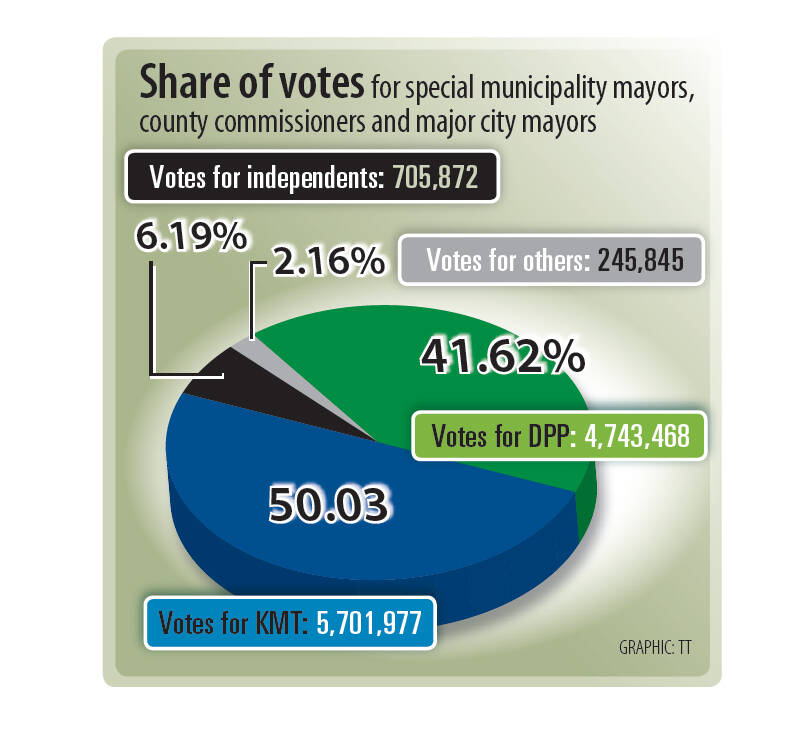After a landslide victory in the local elections on Saturday, the Chinese Nationalist Party (KMT) is planning to nominate a candidate for the 2024 president election by the first half of next year, a source said yesterday.
New Taipei City Mayor Hou You-yi (侯友宜) — who convincingly won re-election, receiving more than 450,000 votes more than the runner-up, former Taichung mayor Lin Chia-lung (林佳龍) — is seen by many in the party as “the most legitimate” contender among KMT officials, the source said.
However, whether KMT Chairman Eric Chu (朱立倫) would be willing to yield the opportunity to Hou remains to be seen, they added.

Ahead of Saturday, Chu set an ambitious goal of winning mayoral elections in more than three of the nation’s six special municipalities, among at least 16 races for top positions in cities and counties.
Although the KMT’s candidates came in third in Hsinchu City and Miaoli County, and the party lost in Penghu County and Kinmen County, winning four special municipalities and 13 cities or counties in total is an overall victory for the party, which came back from a crushing defeat in the four referendums on Dec. 18 last year.
Chu can take credit for the election wins, as well as putting the KMT back in charge of Taoyuan, which has been governed by the Democratic Progressive Party (DPP) since it was upgraded to a special municipality in 2014, political observers said.
Even if he did not run for president himself, Chu would certainly have a say in the party’s nomination, they said, adding that the focus of attention would be whether Chu would “maneuver the political machine … to block Hou.”
Although many KMT members regard Hou as having the best chance of winning the presidential election, running for the post only one year after winning re-election as mayor might be risky, some political watchers said.
Hou won re-election with about 62.42 percent of the vote, far exceeding the 57.2 percent of votes he received in 2018.
However, Hou should take into consideration whether the voters in New Taipei City would also support his presidential bid, they said.
Broadcasting Corp of China chairman Jaw Shaw-kong (趙少康) yesterday said that Hou would have to convince those who voted for him and, if he decides to run for president, consider who could win in a byelection to replace him as mayor.
Another potential contender comes from central Taiwan.
Taichung Mayor Lu Shiow-yen (盧秀燕) won re-election by defeating DPP candidate Tsai Chi-chang (蔡其昌) by more than 270,000 votes, which makes her another possible presidential candidate for the KMT, political observers said.
Lu yesterday said she “never thought about” running for president, adding that her focus is on working hard for Taichung.
Additional reporting by Chen Chien-chih

A preclearance service to facilitate entry for people traveling to select airports in Japan would be available from Thursday next week to Feb. 25 at Taiwan Taoyuan International Airport, Taoyuan International Airport Corp (TIAC) said on Tuesday. The service was first made available to Taiwanese travelers throughout the winter vacation of 2024 and during the Lunar New Year holiday. In addition to flights to the Japanese cities of Hakodate, Asahikawa, Akita, Sendai, Niigata, Okayama, Takamatsu, Kumamoto and Kagoshima, the service would be available to travelers to Kobe and Oita. The service can be accessed by passengers of 15 flight routes operated by

GIVE AND TAKE: Blood demand continues to rise each year, while fewer young donors are available due to the nation’s falling birthrate, a doctor said Blood donors can redeem points earned from donations to obtain limited edition Formosan black bear travel mugs, the Kaohsiung Blood Center said yesterday, as it announced a goal of stocking 20,000 units of blood prior to the Lunar New Year. The last month of the lunar year is National Blood Donation Month, when local centers seek to stockpile blood for use during the Lunar New Year holiday. The blood demand in southern Taiwan — including Tainan and Kaohsiung, as well as Chiayi, Pingtung, Penghu and Taitung counties — is about 2,000 units per day, the center said. The donation campaign aims to boost

ENHANCING EFFICIENCY: The apron can accommodate 16 airplanes overnight at Taoyuan airport while work on the third runway continues, the transport minister said A new temporary overnight parking apron at Taiwan Taoyuan International Airport is to start operating on Friday next week to boost operational efficiency while the third runway is being constructed, the Ministry of Transportation and Communications said yesterday. The apron — one of the crucial projects in the construction of the third runway — can accommodate 16 aircraft overnight at the nation’s largest international airport, Minister of Transportation and Communications Chen Shih-kai (陳世凱) told reporters while inspecting the new facility yesterday morning. Aside from providing the airport operator with greater flexibility in aircraft parking during the third runway construction,

American climber Alex Honnold is to attempt a free climb of Taipei 101 today at 9am, with traffic closures around the skyscraper. To accommodate the climb attempt and filming, the Taipei Department of Transportation said traffic controls would be enforced around the Taipei 101 area. If weather conditions delay the climb, the restrictions would be pushed back to tomorrow. Traffic controls would be in place today from 7am to 11am around the Taipei 101 area, the department said. Songzhi Road would be fully closed in both directions between Songlian Road and Xinyi Road Sec 5, it said, adding that bidirectional traffic controls would